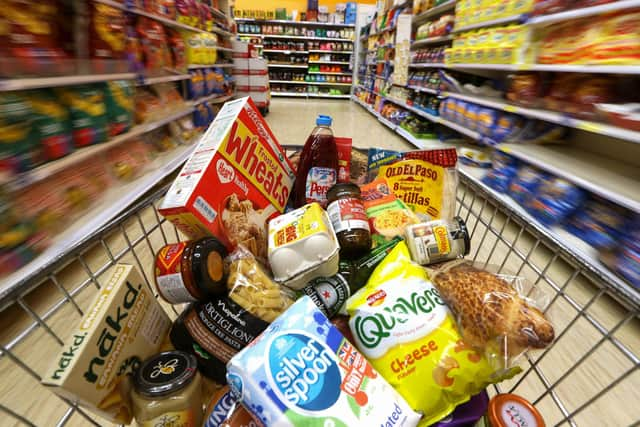ONS says drop in inflation sharpest since cost-of-living crisis began, so why are food prices still setting us back so much?
and live on Freeview channel 276
The UK has recorded the sharpest fall in inflation since the cost-of-living crisis began, with a drop in the annual rate to 8.7% in April, but food prices continued to rise at the fastest pace in 45 years.
The Office for National Statistics (ONS) said annual inflation as measured by the consumer prices index fell below double digits for the first time since August, with a decline from 10.1% in March.
Inflation peaked at 11.1% in October.
Advertisement
Hide AdAdvertisement
Hide AdFood price inflation fell marginally from March to April, but food prices are still 19.1% higher than a year ago - close to record highs.
Olive oil, eggs, and sauces and spices have recorded the largest annual price rises.
The sharp fall came as the record energy price increases for households a year earlier were not repeated, although this was offset by the rising cost of a weekly shop as food and non-alcoholic drink prices soared by 19% in the 12 months to April.
Grant Fitzner, the ONS chief economist, said: “Prices in general remain substantially higher than they were this time last year, with annual food price inflation near historic highs.”


Advertisement
Hide AdAdvertisement
Hide AdReflecting stubbornly high levels of inflation as the headline rate cools more slowly than anticipated, City economists had forecast a bigger decline in inflation in April to 8.2%.
The news comes as economists warn that Rishi Sunak’s target to halve the rate of inflation this year will be met within a finer margin than expected.
According to the latest snapshot from the ONS, electricity and gas prices contributed about 1.4 percentage points to the fall in the annual inflation rate, as last April’s rise in the Ofgem price cap drops out of the calculation.
It said this was partly offset by food prices continuing to rise at the fastest annual rate since 1977, as well as rising costs for recreation and culture, alcoholic beverages and tobacco, communication, and transport.
Advertisement
Hide AdAdvertisement
Hide AdJeremy Hunt, the chancellor, said in an official statement: “The IMF said yesterday [May 23] we’ve acted decisively to tackle inflation but although it is positive that it is now in single digits, food prices are still rising too fast.”
Economics analyst and journalist Faisal Islan told another news outlet: “Markets now calculate a further interest rate rise is a certainty. The jump in core inflation may also bring another rise in August into play.
"In less well-reported remarks yesterday, the International Monetary Fund warned of "premature celebration" on defeating inflation.
"When an economy hits double digit inflation, it tends to take years, not weeks to get it out of the system.”
The government’s target for inflation is 2%.
Advertisement
Hide AdAdvertisement
Hide AdYesterday [Tuesday, May 23] the International Monetary Fund forecast that this would not be reached until mid-2025.
A leader of the Unite union has warned there is "no end in sight" to the cost-of-living crisis despite the fall in inflation, as prices are still rising "much faster than wages".
Rising prices have played a key factor in strikes in sectors across the economy as workers see their pay fall further behind inflation.
Unite general secretary Sharon Graham has said: "Falling inflation does not mean we've reached a turning point where things can only get better."
.